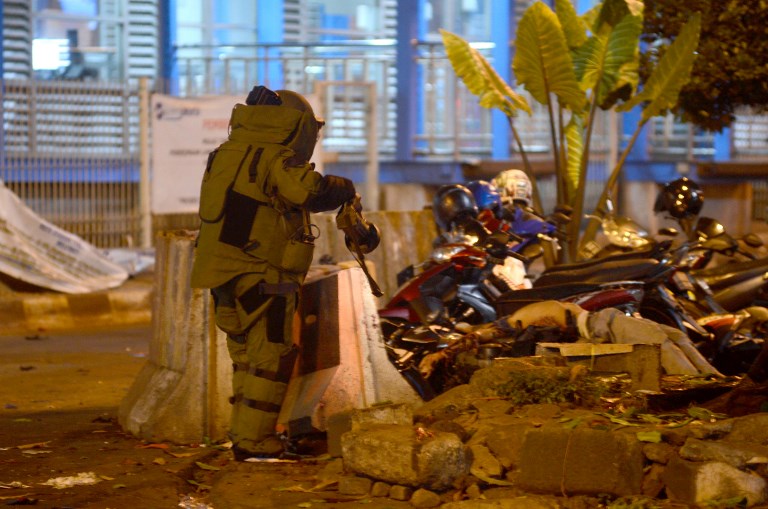A suicide bombing attack outside a busy bus terminal in the Indonesian capital Jakarta on Wednesday killed three police officers, the latest assault to hit the Muslim-majority country as it struggles with a surge of terror plots.
Several other police officers and civilians were injured when two bombers launched the attack in a street next to the station, which sent panicked people running for their lives and clouds of black smoke billowing into the sky.
Human body parts and shattered glass were strewn across the road following the attack, which happened at about 9:00 pm as police were helping to secure a parade by a local group outside the terminal in the working-class district.
It was not clear who was behind the attack but Indonesia, the world’s most populous Muslim-majority country, has been on high alert after a string of plots and attacks in recent times by militants inspired by the Islamic State (IS) group.
The Kampung Melayu terminal in east Jakarta — which is frequented by locals and is not popular with foreign visitors — had been busy when the attack happened, and witnesses described scenes of panic as two blasts rang out minutes apart.
Dicky Wahyudin, 37, said he had been drinking a coffee across the road when the attack happened, prompting people to flee.
“Suddenly I heard two explosions, which were big — I immediately ran away,” he told AFP.
A local shopkeeper, Rosmala — who like many Indonesians goes by one name — added: “At first I saw smoke and shattered glass, the earth was shaking, I was shocked. After a few minutes there was another blast.”
– Struggle with militancy –
National police spokesman Setyo Wasisto told reporters that two suicide bombers had been involved in the attack and three police officers had died. He had earlier said he believed only one attacker was involved.
“I have to convey my deepest condolences because three police officers died,” he said.
Five other police officers and five civilians were injured, Wasisto said. Both suicide bombers, who were men, died during the attack, he added.
The terminal is a local hub served by minibuses and buses.
Indonesia has long struggled with Islamic militancy and has suffered a series of attacks in the past 15 years, including the 2002 Bali bombings that killed 202 people, mostly foreign tourists.
A sustained crackdown weakened the most dangerous networks but the emergence of IS has proved a potent new rallying cry for radicals.
Hundreds of radicals from the Southeast Asian state have flocked to fight with IS, sparking fears that weakened extremist outfits could get a new lease of life.
A gun and suicide attack in the capital Jakarta left four attackers and four civilians dead in January last year, and was the first assault claimed by IS in Southeast Asia.
Numerous recent IS-linked plots in Indonesia have been botched or foiled, with analysts saying that many of the country’s militants lack the capacity to launch serious attacks.




